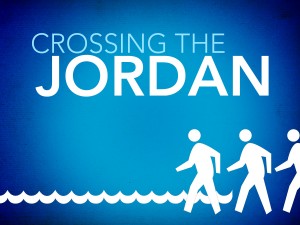 by Fr. Patrick Henry Reardon
by Fr. Patrick Henry Reardon
The Book of Joshua is introduced in a decisive—not to say, abrupt—-fashion:
“It came to pass, after the death of Moses, the Lord’s servant, that the Lord spoke to Joshua ben-Nun, Moses’ deputy, saying, ‘Moses My servant is dead. Now, then, rise up, cross over this Jordan, you and all this people, to the land which I am giving to them-the sons of Israel. As I declared to Moses, I have given you every place that the sole of your foot may tread. From the wilderness and this Lebanon as far as the great river, the River Euphrates, all the land of the Hittites, and to the Great Sea toward the setting of the sun, shall be your territory.'”
Since the conquest and settling of the Holy Land is the entire story in the Book of Joshua, it is important to understand these opening lines. We may begin by observing that—in several senses—boundaries are being crossed.
First, with respect to time: The death of Moses is a distinct dividing line in biblical history. The death of Moses marks the end of a specific era. All Israel was waiting for him to die; at last they were able to enter the Promised Land.
Second, this division pertains to space, as well as to time; the Jordan River is a geographical boundary; its crossing meant the end of wandering and the commencement of geographical stability. Thus, the text presents a crossover (‘abar, the root word of “Hebrew”) in both time and space.
The details of the Lord’s command to Joshua convey the impression of “here and now”: Moses is dead. Now then—we’ttah-–rise up, cross over. Although everyone is to go over the river, the Lord’s command is laid on Joshua specifically; this is conveyed by the singular imperative form of the verbs: ‘rise up, cross over” (qum ‘abor).
In the repetition of the adjective “this” (hazzeh) the reader senses a physical immediacy, as though the Lord, in the act of commanding Joshua, is actually pointing to “this Jordan,” “this people,” “this Lebanon.”
Within the Lord’s command, the reader feels a tension, as it were, between the established past and the still indefinite future. This is conveyed in the tenses of the two verbs:
“I have given you every place that the sole of your foot may tread.”
The “I have given” (netattiv) is a “perfect of certitude”; the gift of the Land has already been made. The “may tread” (tidrok) is an “imperfect of possibility.” An established past and a somewhat indistinct future are combined.
With respect to the past, this command to Joshua is based on the Lord’s promise to Abraham:
“To your seed I will give this land” (Genesis 12:7; cf. 15:7; 17:8).
Two qualifications attended that gift. First, it was not an untrammeled real estate endowment; it was a clause in a covenant. To understand the gift, it is essential to understand the covenant. Second, the sons of Israel could never possess the land except as tenants:
“The land shall not be sold permanently, for the land is Mine; for you are strangers and sojourners with Me. (Leviticus 25:23).
With respect to the future, as well, Israel’s possession of the land is still a covenantal clause, not a real estate bequest separable from that covenant. When Israel, under Joshua’s leadership, took possession of the land, it was to prepare for the covenant’s fulfillment, in which—as God told Abraham—all the nations of the world would be blessed.
We Christians have a specific understanding of that fulfillment; it was declared by a rabbi who bore witness to it:
“Now to Abraham and his seed were the promises made. He does not say, ‘And to seeds,’ as of many, but as of one, ‘And to your seed,’ who is Christ” (Galatians 3:16).
The covenant with Abraham, of which the possession of the land was a clause, was fulfilled in Christ; Paul identifies Christ as the “seed” to whom the original promise was made.
The Israelites, then, conquered the land in order to prepare a place for God’s Messiah, Abraham’s seed, to be born and to live and to effect the work of salvation. Their territorial possession prepared for the rooting of the Cross in the promised soil. The ultimate consecration of the Promised Land came when the Messiah—who, like its original conqueror, was named Yeshuah—rose from a grave in the middle of it.
Christian theology declines to separate God’s gift of the land to Israel from the larger context that defines it. God makes no promises—God gives no gifts—apart from the Messiah. He is the divine affirmation, God’s yes, to mankind:
“For all the promises of God in him are yes” (2 Corinthians 1:20).
This consideration is essential to the proper theological understanding of the Promised Land: It pertains to that greater contract which is the salvific blessing of the human race.
Christian theology refuses to isolate God’s gift of the Promised Land from the canonical fullness introduced into history by the arrival of the Messiah.
